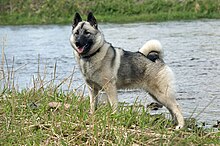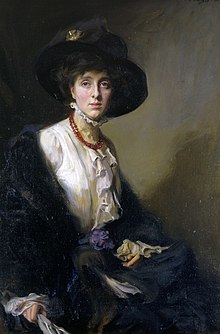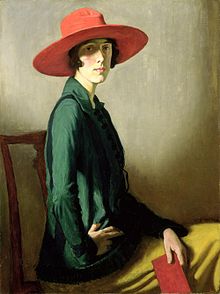Orlando: A Biography
Appearance

Orlando: A Biography (1928) is a novel by Virginia Woolf, which she called "a biography", intending it to be the first of a new genre breaking barriers between fiction and non-fiction. It was inspired by the life and behavior of her friend Vita Sackville-West.
Quotes
[edit]





- He — for there could be no doubt of his sex, though the fashion of the time did something to disguise it — was in the act of slicing at the head of a Moor which swung from the rafters.
- Chapter 1, first lines
- Green in nature is one thing, green in in literature another. Nature and letters seem to have a natural antipathy; bring them together and they tear each other to pieces.
- Chapter 1
- For the Philosopher is right who says that nothing thicker than a knife's blade separates happiness from melancholy; and he goes on to opine that one is twin fellow to the other; and draws from this the conclusion that all extremes of feeling are allied to madness; and so bids us take refuge in the true Church (in his view the Anabaptists), which is the only harbor, port, anchorage, etc., he said, for those tossed on this sea.
- Chapter 1
- For it has to be remembered that crime and poverty had none of the attractions for the Elizabethans that they have for us. They had none of our modern shame of book leaning, none of our belief that to be born the son of a butcher is a blessing an to be unable to read a virtue; no fancy that what we call ‘life’ and ‘reality’ are somehow connected with ignorance and brutality nor, indeed any equivalent for these two words at all. It was not to seek ‘life’ that Orlando went among them not in quest of ‘reality’ that he left them.
- Chapter 1
- At the age of thirty, or thereabouts, this young Nobleman had not only had every experience that life has to offer, but had seen the worthlessness of them all. Love and ambition, women and poets were all equally vain. Literature was a farce. The night after reading Greene's Visit to a Nobleman in the Country, he burnt in a great conflagration fifty-seven poetical works, only retaining 'The Oak Tree', which was his boyish dream and very short. Two things alone remained to him in which he now put any trust: dogs and nature; an elk-hound and a rose bush. The world, in all its variety, life in all its complexity, had shrunk to that. Dogs and a bush were the whole of it.
- Chapter 2
- Time, unfortunately, though it makes animals and vegetables bloom and fade with amazing punctuality, has no such simple effect upon the mind of man. The mind of man, moreover, works with equal strangeness upon the body of time. An hour, once it lodges in the queer element of the human spirit, may be stretched to fifty or a hundred times its clock length; on the other hand, an hour may be accurately represented on the timepiece of the mind by one second. This extraordinary discrepancy between time on the clock and time in the mind is less known than it should be and deserves fuller investigation.
- Chapter 2
- While fame impedes and constricts, obscurity wraps about a man like a mist; obscurity is dark, ample, and free; obscurity lets the mind take its way unimpeded. Over the obscure man is poured the merciful suffusion of darkness. None knows where he goes or comes. He may seek the truth and speak it; he alone is free; he alone is truthful, he alone is at peace.
- Chapter 2
- Better was it to go unknown and leave behind you an arch, a potting shed, a wall where peaches ripen, than to burn like meteor and leave no dust.
- Chapter 2
- Chairs and tables, however richly gilt and carved, sofas, resting on lions' paws with swans' necks curving under them, beds even of the softest swansdown are not by themselves enough. People sitting in them, people lying in them improve them amazingly.
- Chapter 2
- The trumpeters, ranging themselves side by side in order, blow one terrific blast: —
'THE TRUTH!
at which Orlando woke.
He stretched himself. He rose. He stood upright in complete nakedness before us, and while the trumpets pealed Truth! Truth! Truth! we have no choice left but confess — he was a woman.- Chapter 3
- The sound of the trumpets died away and Orlando stood stark naked. No human being, since the world began, has ever looked more ravishing. His form combined in one the strength of a man and a woman's grace.
- Chapter 3
- We may take advantage of this pause in the narrative to make certain statements. Orlando had become a woman — there is no denying it. But in every other respect, Orlando remained precisely as he had been. The change of sex, though it altered their future, did nothing whatever to alter their identity. Their faces remained, as their portraits prove, practically the same. His memory — but in future we must, for convention's sake, say 'her' for 'his,' and 'she' for 'he' — her memory then, went back through all the events of her past life without encountering any obstacle. Some slight haziness there may have been, as if a few dark drops had fallen into the clear pool of memory; certain things had become a little dimmed; but that was all. The change seemed to have been accomplished painlessly and completely and in such a way that Orlando herself showed no surprise at it. Many people, taking this into account, and holding that such a change of sex is against nature, have been at great pains to prove (1) that Orlando had always been a woman, (2) that Orlando is at this moment a man. Let biologists and psychologists determine. It is enough for us to state the simple fact; Orlando was a man till the age of thirty; when he became a woman and has remained so ever since.
- Chapter 3
- No passion is stronger in the breast of man than the desire to make others believe as he believes. Nothing so cuts at the root of his happiness and fills him with rage as the sense that another rates low what he prizes high. Whigs and Tories, Liberal party and Labour party — for what do they battle except their own prestige? It is not the love of truth, but desire to prevail that sets quarter against quarter and makes parish desire the downfall of parish. Each seeks peace of mind and subserviency rather than the triumph of truth and exaltation of virtue — But these moralities belong, and should be left to the historian, since they are as dull as ditch water.
- Chapter 3
- The chief charges against her were (1) that she was dead, and therefore could not hold any property; (2) that she was a woman which amounts to much the same thing …
- Chapter 4.
- Something, perhaps, we must believe in, and as Orlando, we have said, had no belief in the usual divinities she bestowed her credulity upon great men — yet with a distinction. Admirals, soldiers, statesmen, moved her not at all. But the very thought of a great writer stirred her to such a pitch of belief that she almost believed him to be invisible. Her instinct was a sound one. One can only believe entirely, perhaps, in what one cannot see.
- Chapter 4
- Only those who have little need of the truth, and no respect for it — the poets and novelists — can be trusted to do it, for this is one of the cases where the truth does no exist. Nothing exists. The whole thing is a miasma — a mirage.
- Chapter 4
- Society is the most powerful conception in the world and society has no existence whatsoever.
- Chapter 4
- On both sides of her sat men and women of the highest distinction. Every man, it was said, had been a Prime Minister and every woman, it was whispered, had been the mistress of a king. Certain it is that all were brilliant, and all were famous. Orlando took her seat with a deep reverence in silence. … After three hours, she curtseyed profoundly and left.
But what, the reader may ask with some exasperation, happened in between. In three hours, such a company must have said the wittiest, the profoundest, the most interesting things in the world. So it would seem indeed. But the fact appears to be that they said nothing. It is a curious characteristic which they share with all the most brilliant societies that the world has seen. Old Madame du Deffand and her friends talked for fifty years without stopping. And of it all, what remains? Perhaps three witty sayings.- Chapter 4
- The hostess is our modern Sibyl. She is a witch who lays her guests under a spell. In this house they think themselves happy; in that witty; in a third profound. It is all an illusion (which is nothing against it, for illusions are the most valuable and necessary of all things, and she who can create one is among the world's greatest benefactors), but as it is notorious that illusions are shattered by conflict with reality, so no real happiness, no real wit, no real profundity are tolerated where the illusion prevails.
- Chapter 4
- As long as she thinks of a man, nobody objects to a woman thinking.
- Chapter 6
Quotes about Orlando: A Biography
[edit]
- Instantly the usual exciting devices enter my mind: a biography beginning in the year 1500 & continuing to the present day, called Orlando: Vita; only with a change about from one sex to the other.
- Virginia Woolf, on Vita Sackville-West being the inspiration for her novel in her journal entry upon conceiving it (5 October 1927), quoted in The Virginia Woolf Reader (1984) edited by Mitchell Alexander Leaska, p. 315
- Suppose Orlando turns out to be about Vita; and its all about you and the lusts of your flesh and the lure of your mind (heart you have none, who go gallivanting down the lanes with Campbell) — suppose there's the kind of shimmer of reality which sometimes attaches to my people, as the lustre on an oyster shell (and that recalls another Mary) suppose, I say, that Sibyl next October says "Theres Virginia gone and written a book about Vita" ... Shall you mind?
- Virginia Woolf, in a letter to Vita Sackville-West (10 October 1927), published in Vita : The Life of V. Sackville-West (1985) by Victoria Glendinning
External Links
[edit]- Project Gutenberg of Australia EBook of Orlando (note, may still be copyright elsewhere)

